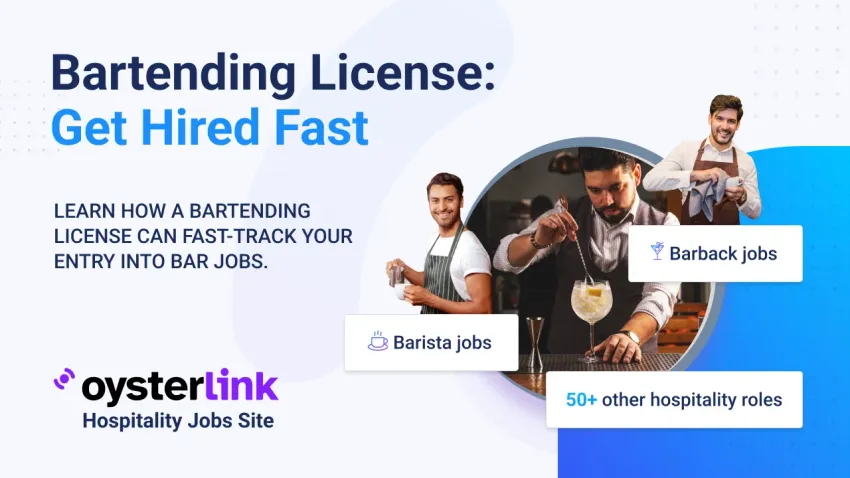In some parts of the United States, obtaining a bartending license is a necessary step to legally work as a Bartender.
Other times, it’s mostly a qualification that employers include in job ads when they want applicants who have an understanding of alcohol safety regulations.
In this article, we’ll walk you through how to get a bartending license, as well as explore where it’s required, how long the process takes and more.
What Is a Bartending License?
A bartending license is an official legal document that proves you’ve completed a recognized program for Bartenders in your state or county.
It qualifies you to serve alcoholic beverages in open containers for immediate consumption in a bar, restaurant or similar establishment.
A bartending license is not always the same as a bartending certification. Check out our article that explains the difference between a bartending license and certification.
In short, a bartending license is often legally required to serve alcohol in certain states or regions, ensuring compliance with local laws.
In contrast, a Bartender certification is a voluntary credential that demonstrates additional training and skills, such as mixology techniques and customer service excellence.
While not mandatory, obtaining a certification can enhance your employability and professionalism in the field.
Online vs. In-Person Bartending License Courses
When pursuing a bartending license, you have the option to choose between online and in-person courses.
Online courses offer flexibility and convenience, allowing you to learn at your own pace. They are often more affordable and can be completed from the comfort of your home.
In-person courses, on the other hand, provide hands-on experience with real bar tools and environments, which can be invaluable for practical skill development.
Consider your learning preferences, schedule, and budget when deciding between these options.
Online Bartending License
Many states allow you to complete the licensing process online, which can be faster and more convenient. Here’s what you need to do:
- Find an approved online course: Look for an online bartending program recognized by your state’s licensing authority. Ensure it covers all required topics, such as alcohol laws and responsible service practices.
- Go through the course materials: Study the course content, which typically includes topics like ID verification, handling intoxicated customers and local regulations for serving alcohol.
- Pass the final exam: At the end of the course, you’ll take an exam to demonstrate your knowledge. A passing score is required to proceed.
- Apply for your official license: After passing the exam, some states automatically issue your bartending license online. In other states, you may need to submit an additional application to your state or local authority and pay a fee.
Traditional Bartending License
If your state requires in-person training, follow these steps to obtain your license:
- Enroll in a state-approved program: Find a licensed bartending school or training center near you. These programs often combine classroom learning with hands-on training.
- Complete the required training hours: In-person courses typically last 40 hours or more and cover mixology techniques, responsible service practices and compliance with state alcohol laws.
- Pass any required tests: Some programs include practical or written exams to ensure you’ve mastered the material.
- Submit your application and fees: After completing your training and passing any required tests, you'll need to submit your application along with proof of your successful completion to your state or local authority.
Do All Bartenders Need a License?
Not all Bartenders need a license, as the requirements vary by state and even by county. In some states, a bartending license is mandatory, while in others it’s entirely optional.
States with strict regulations often require Bartenders to complete a responsible alcohol service program and pass a final exam before receiving their license.
However, even in states like New York and Florida where a license isn’t required, many establishments prefer hiring licensed Bartenders.
Also, in some cases the state or local government incentivizes establishments that hire such Bartenders.
This is because a license demonstrates a Bartender’s understanding of alcohol laws, responsible service practices and how to handle alcohol-related situations effectively.
State-By-State Bartending License Requirements
Understanding the laws in your area is crucial to ensure you’re fully qualified to work behind the bar. Some states have clear statewide rules, while others leave the decision to individual counties.
Let’s take a closer look at the variations.
States That Require All Bartenders To Have a License
In the states listed below, obtaining a bartending license (otherwise called a bartending permit in some locations) is a strict legal requirement for anyone serving alcohol.
States in Which Bartending License Laws Vary by County
Some states do not have a blanket policy for bartending licenses. Instead, they impose regulations based on the location or the Bartender’s age.
If you’re based in one of the states below, it’s important to look up local regulations and ensure you meet all of them before you start applying:
- Colorado
- Hawaii
- Idaho
- Kansas
- Kentucky
- Maryland
- Montana
- Nebraska
- New Jersey
- North Dakota
- South Dakota
- West Virginia
- Wyoming
How Much Is a Bartending License in Each State?
The cost of obtaining your bartending license also varies by the state you’re based in. It also depends on the type of bartending licensing program or school you choose to enroll in.
Schools that offer classroom training and teach mixology charge higher than those that let you take an online course.
Typically, the cost of getting a license online is between $9 and $40. If you want to receive practical training while earning your license, the cost may range between $300 and $1,600.
Which TIPS Certification Course Do I Need To Get a Bartending License?

[Source: TIPS ]
TIPS (Training for Intervention Procedures) certification is approved nationwide and completing it can grant you a bartending license.
Still, it’s important to read all the details regarding the course designed for your state, as some of them don’t meet all the legal requirements.
For example, while the TIPS On-Premise course may be accepted in most states, others may require additional training or a different type of course depending on the type of alcohol service or location (e.g., off-premise sales or gaming establishments).
The TIPS courses are designed to teach Bartenders how to serve drinks responsibly while promoting safe and responsible consumption.
These courses cover essential topics such as federal and state alcohol laws, recognizing fake IDs and handling challenging situations involving intoxicated customers.
There are three different types of TIPS courses, depending on the type of alcohol service you're involved in:
- TIPS On-Premise Course: This course is tailored for Bartenders and Servers working in bars, restaurants and other venues where alcohol is consumed on-site.
- TIPS Off-Premise Course: Designed for those selling alcohol at retail locations, like liquor stores, this course focuses on the legal requirements and responsible alcohol sales in off-premise environments.
- TIPS for Gaming and Concession Course: Aimed at Bartenders and Servers in casinos or at large venues, this course covers alcohol service in gaming establishments and other high-traffic event settings.
The cost of taking the course through the official website varies by state and course type.
How Long Does It Take To Get a Bartending License?
If your state allows online training, you could complete the process as quickly as four hours to two days. Online courses are popular for their speed and convenience, making them an excellent choice for meeting legal requirements quickly.
For states that require more comprehensive instruction, in-person training programs are the norm. These typically range from 40 hours to several weeks, depending on the curriculum.
If you enroll in a full-time in-person course, you could finish in about two weeks, but part-time in-person programs may stretch out over months or even up to a year to accommodate busy schedules.
How Long Is a Bartending License Good For?
The duration of your bartending license varies by state, as each has its own regulations regarding renewal. Generally, bartending licenses are valid for a period of two to five years.
When renewing your license, you’ll either have to complete another training program or re-register with the state.
Benefits of a Bartender License
Enrolling in a bartending school and completing training is a good way to get into a Bartender career. Depending on your state, you may not even be able to get hired for the role unless you’re a licensed Bartender.
Even if your state doesn’t require a license, like Florida or New York, attending an alcohol server program can open up employment opportunities in the industry.
Establishments will likely see you as a more hireable candidate as the bartending license serves as proof of the skills you’ve acquired. Not to mention, you’re more likely to stand out among other candidates.
Moreover, establishments prefer to bring in individuals who are trained to serve alcoholic beverages responsibly and know what to do in all alcohol-related situations.
Obtaining a license can also serve as a foundation for your professional development. Even the top Bartenders say it’s a great way to get foundational knowledge before you start learning through hands-on experience.
What Are the Requirements To Be a Bartender?
To be a Bartender, you need to meet the age requirement in your state. Some states allow establishments to hire candidates as young as 18 or 19 for the role of a Bartender. In others, the minimum age for the role is 21.
Some states also have laws that prohibit establishments from hiring Bartenders who have been charged with a felony in recent years.
Again, the laws regarding the duration of how long a felony charge can impact employment vary by state.

Some states even incentivize establishments to hire certified Bartenders by reducing potential penalties and liability costs.
Find More Bartending Career Advice on OysterLink
At OysterLink, we’re here to support your journey as a Bartender. Discover industry insights, salary data and advice on building the skills that set top Bartenders apart.
Whether you’re pursuing your license, perfecting your craft or aiming for a management role, OysterLink is your go-to platform for guidance.
Explore our career resources today and take the next step in your bartending career with confidence.










Loading comments...